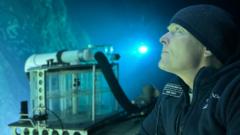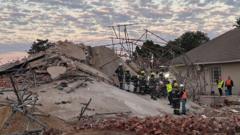**David Lochridge's warnings about Titan's design and safety protocols went unheeded, resulting in tragedy.**
**Whistleblower Exposes Safety Failures Behind Titan Submersible Tragedy**

**Whistleblower Exposes Safety Failures Behind Titan Submersible Tragedy**
**Safety concerns raised by former Oceangate director prior to deadly dive highlight accountability issues.**
David Lochridge, a former director at Oceangate, has come forward after the Titan submersible tragedy, revealing that safety warnings he raised were ignored leading up to the catastrophic incident. The Titan imploded during its voyage to the Titanic wreck in June 2023, claiming the lives of all five aboard, including Oceangate's CEO, Stockton Rush.
Lochridge was dismissed from the company in 2018 after expressing urgent safety concerns regarding the submersible's construction and testing. His worries were confirmed by a recent US Coast Guard report that identified significant lapses in Oceangate's safety, maintenance, and testing protocols as factors that contributed to the disaster.
Describing the project as built on unfulfilled promises, Lochridge shared that he hoped for a rescue but had foreseen a possible incident due to the sub’s inadequate design. “People were sold a lie,” he commented, reflecting on Oceangate's assurances. He noted the absence of third-party safety certifications, particularly critical as Titan was being constructed from unproven materials like carbon fiber.
After working diligently at Oceangate for seven years, Lochridge's confidence began to wane when he witnessed glaring flaws in the sub's hull and other vital components. Problems such as gaps in the carbon fiber and incorrectly machined titanium domes raised alarming red flags. When he repeatedly raised these concerns, he encountered resistance from the company's leadership.
In early 2018, during a tense meeting addressing his safety report, Lochridge's warnings were dismissed. Shortly after this confrontation, he was terminated from Oceangate. Undeterred, he reported his concerns to the Occupational Safety and Health Administration (OSHA) and attempted to advocate for reforms, but ultimately faced legal retaliation from his former employer, which hindered his efforts.
Oceangate continued its mission amid rising concerns, conducting multiple dives and taking paying passengers to the Titanic site, all while Lochridge’s warnings remained largely unaddressed. The whistleblower criticized OSHA for failing to investigate his claims adequately and expressed that, had proper measures been taken, the catastrophic outcome could have been prevented.
The US Coast Guard's investigation corroborates Lochridge's assertions, highlighting failures in communication and procedural oversight related to his complaints. It pointed out that the agency could have acted more swiftly to avert the disaster.
In the aftermath of the Titan incident, Oceangate has ceased operations, pledging to comply with the ongoing investigations. However, Lochridge's insights shed light on the paramount importance of stringent safety protocols in high-stakes excursions like deep-sea exploration, emphasizing accountability and transparent communication in maritime safety.




















